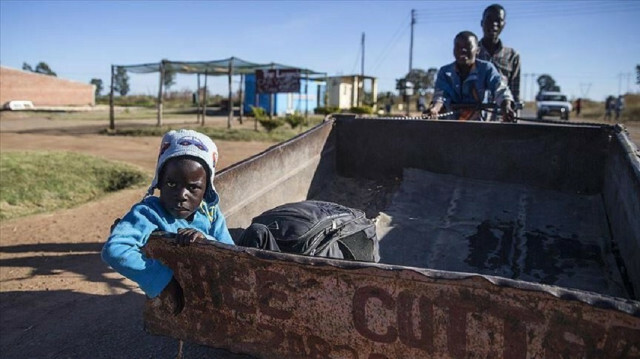

File photo
Despite just 0.7% of its population, Muslims in Zimbabwe engaged in acts of welfare, say experts on World Kindness Day
Even as Muslims represent just 0.7% of Zimbabwe’s population, they are said to be at the forefront of voluntary activities such as donating money for charities and helping the homeless orphans.
“Several Muslims came to our rescue and even as we live at our parents’ unfinished home, we are now much better than before because we are getting support and you can see I am now able to do some sewing work which is helping us while my brother is getting support with his fees,” said Nelia, who along with her 14-year-old brother Davison Chambati was living on a street after the death of their parents five years ago.
Coinciding with the World Kindness Day – the global day that promotes the importance of being kind to each other – the siblings told Anadolu Agency that it is a common sight to see Muslim community members helping the poor in the capital Harare.
Chambati, who dropped out of school as he was unable to pay the tuition fee, has now resumed his studies while his sister with the help of the Muslim community has become a qualified dressmaker.
Many Muslims like Razia Karawley do not run any organized charity groups, but have been helping the people in individual capacities.
“I don’t run any charities. I support a few people and I am merely someone who collects stuff from the people in the community and forward it to the particular charity that asks for my help,” Karawley told Anadolu Agency.
Estimates suggest that Muslims number approximately 120,000 in the 12.7 million population of Zimbabwe, comprising primarily South Asian migrants, indigenous Zimbabweans, and migrants from other African countries.
As Zakat – a form of almsgiving – is a religious obligation for Muslims scores of charity organizations have emerged in the southern African country.
“The Muslim society has been at the top of doing charity because we follow the example of Prophet Muhammad. He taught us that we are not truly believers until we have a love for others. Every one of us desires happiness, and so we must wish the same for others,” said Henry Balakazi, who collects donations under the banner of the Zimbabwe National Zakat Fund and uses them for the upliftment of the poor.
- Muslim women supporting families
Yusufu Binali, 41, a representative of the Muslim World League and local international relations director with the Dar al Salaam Foundation, is also engaged in distributing food hampers to poorer communities.
“We distribute food hampers to certain communities to alleviate the high cost of living and hunger. We also look after orphans and vulnerable children, paying for their school fees, buying clothes, and giving them monthly stipends quarterly or throughout the year,” he said.
Fazila Mahomed, a Zimbabwean journalist, has also launched a charity group the Citizens Initiative Zimbabwe to help people regardless of faith. To overcome water problems in one of the Harare’s high-density suburbs Kuwadzana Extension, her group dug a well and set up solar powered pump.
Many Muslim women under the banner Islamic Women’s Initiative Network (IWIN) are supporting families headed by single unemployed mothers.
Zarita Mahomed from IWIN said they are currently supporting more than 114 such women.
“We have helped build homes, reticulate the area, sunk a few boreholes, built a Masjid and we have a running soup kitchen while we aim to build a clinic which should be running by early next year in partnership with the Islamic Medical Association of Zimbabwe,” she said.
#Muslim
#Zimbabwe
#World Kindness Day
